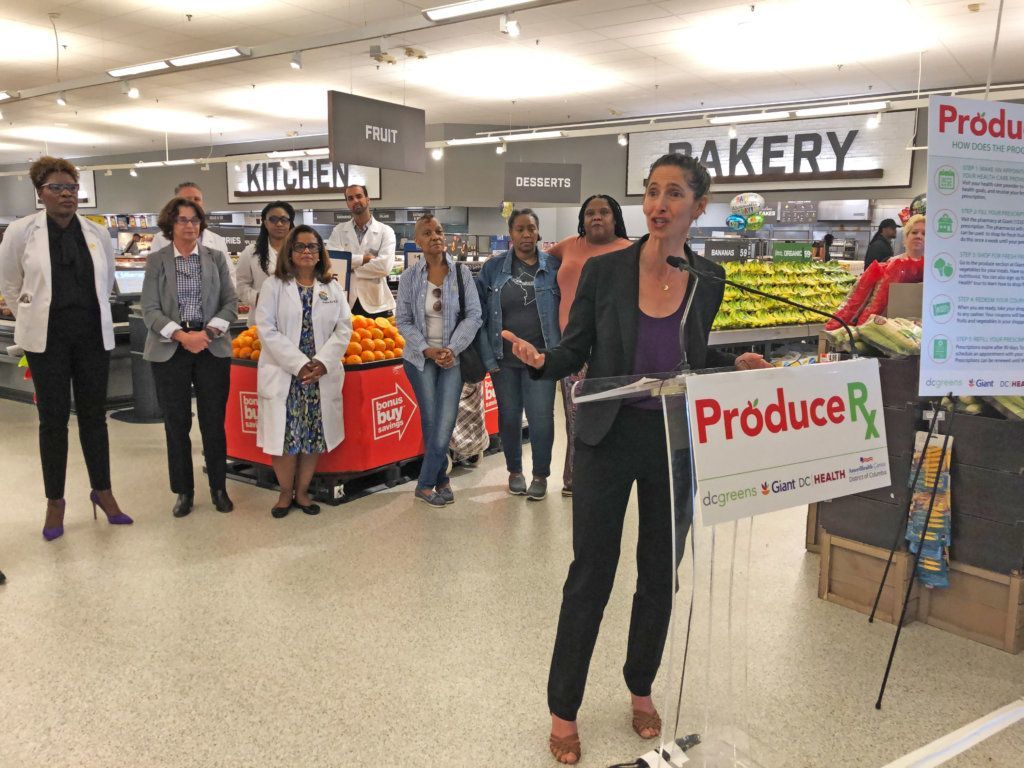Three weeks ago, Adrienne Dove left her doctor’s appointment at Community of Hope and went to the pharmacy counter at Giant Food on Alabama Avenue in Southeast to fill a prescription. Only instead of pills, the pharmacist handed Dove a coupon for $40 worth of produce every two weeks.
“My household really eats up the vegetables and the fruits,” said Dove, a D.C. resident and mother who battles high blood pressure.
“We were already on that path [to healthier eating], but we were starting to slack. Now, we’re more on that path.”
On Wednesday, D.C. government leaders, health policy experts and food justice advocates met at the Giant Food in Ward 8 — the community’s only full-service grocery store — to launch a pilot program that treats food like medicine for local residents suffering from diet-related chronic illnesses, including obesity, Type 2 diabetes and hypertension.
Five-hundred local residents are participating in the pilot, called Produce Rx — a partnership between DC Greens, Giant Food, DC Health, AmeriHealth Caritas and several community health clinics in the area, including Community of Hope.
“Frequently, patients tell us that their food stamps are not stretching for them to buy oranges and apples and fresh fruits and vegetables, so they’re relying on canned, or maybe if things are a little bit better, frozen,” said Megan Moore, director of population health services at Community of Hope, which offers care and services at six locations east of the Anacostia River. “This is an opportunity to get them more access so they can actually, realistically, work on some better choices.”
In D.C., more than 52,000 residents live with diabetes, a disease that disproportionately affects African Americans and those living in Ward 8. The same racial and geographical inequality is also true for obesity, DC Health reports show. More than 70% of adults living east of the Anacostia River in Wards 7 and 8 are overweight or obese. And these disparities contribute to a 15-year difference in life expectancy for residents in Ward 8, compared to those living in Wards 2 and 3.
“So many of our health issues in our community are related to food-related illnesses … and we cannot improve the health and well-being of our community without creating food access,” said DC Health Director Dr. LaQuandra Nesbitt.
When asked how important it was to establish a program that makes healthy food available to those who need it most, Ward 8 councilmember Trayon White said, “It’s a matter of life and death.”
“For far too many people, we’ve been eating food that’s detrimental to our health,” said White, a D.C. native who told the crowd that he grew up on hot dogs and bologna.
“But we know in the long term, it’s going to cost us.”
DC Greens Executive Director Lauren Biel said the nonprofit implemented a version of Produce Rx with farmers markets seven years ago, and many of its participating patients (about 100 each season) saw improvements in their individual health metrics. The program also resulted in a 60% increase in patient visits — “Because they were getting something so tangible; they were getting healthy food when they went and saw their doctors,” Biel said.

Now in an expanded format, Produce Rx will not only reach more people, it will also reinforce the connection between food and health. When enrolled patients visit the pharmacy counter to pick up their produce coupons ($20 per week or $40 biweekly), they’ll have the option to talk with an in-store nutritionist or take a tour of the store — all at a time that works for them.
“Everybody loves farmers markets, but it is a wonderful thing to be to go to a store that has full, open store hours,” said Beil, who hopes to expand the program after the pilot to more Giant Food stores, healthy corner stores and markets throughout the region.
And while it’s too early to measure the impact of the newly relaunched Produce Rx on health outcomes, Community of Hope’s Moore said she already sees a boost in her patients’ confidence levels, especially when it comes to setting goals.
“If they know they can go to the grocery store and get what they need to be healthy, they’re more likely to set a weight-loss goal. So we hope that in the long-run it will prevent pre-diabetes, diabetes and help people manage their weight,” she said.







